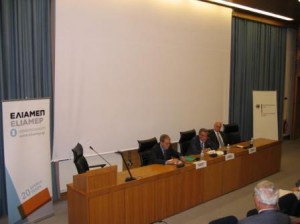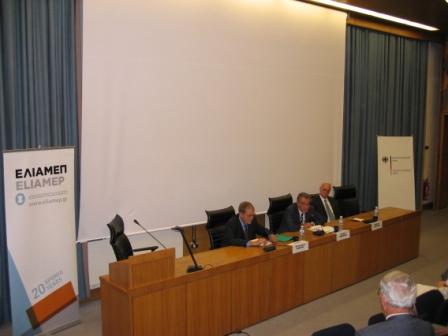 ELIAMEP in cooperation with the German Embassy in Athens organized a lecture at the University of Athens with Claus Offe, Professor, Hertie School of Governance, Berlin, on the outcome of the September 2009 general elections in Germany. Following four days after the Greek parliamentary elections, the public discussion drew more than seventy people eager to hear about the German case and compare it with the developments in Athens.
ELIAMEP in cooperation with the German Embassy in Athens organized a lecture at the University of Athens with Claus Offe, Professor, Hertie School of Governance, Berlin, on the outcome of the September 2009 general elections in Germany. Following four days after the Greek parliamentary elections, the public discussion drew more than seventy people eager to hear about the German case and compare it with the developments in Athens.
Ambassador Dr. Schultheiss emphasized how both Germany and Greece were still under the impression of two elections which brought considerable change and included unexpected outcomes. While Greece opted for a comprehensive change of government, the German electorate favored the smaller version of a change in the coalition composition of government.
Prof. Offe placed the German elections in the context of the economic and financial sector crises, with far-reaching repercussions in areas such as unemployment, budgetary crisis and social policy making capacity. tThe German party system now essentially comprises a field of five-and-a-half organizations. The new ‘kid on the block’ is Die Linke, a leftist party with roots in the eastern parts of Germany that successfully attracted disenchanted and disillusioned former voters of the Social Democrats (SPD).
Prof. Offe sees the German party landscape in full motion, with a new polarization of political forces taking shape. The SPD, the environmental Greens and Die Linke now compete for prime position among the left-of-centre electorate. By contrast, the governing Christian Democrats (CDU) of Chancellor Ms Angela Merkel have dropped any references to their Christian social roots. The CDU is currently in coalition negotiations with the undisputed winner of the general elections, the neo-liberal, free market FDP.
Their prime political objective is to establish a so-called bourgeois coalition (bürgerlich) with the CDU that is focused on tax reductions, changes in social policy making and collective bargaining agreements. These policy objectives are embedded in a new semantic geared towards a segment of the electorate that resents a collective style of decision making and consensus politics. Prof. Offe sees this as a new pattern of political polarization emerging in Germany, with new dividing lines and political cleavages starting to manifest themselves.
The subsequent lively discussion addressed issues ranging from the non-participation of intellectuals during the electoral campaign, foreign policy implications such as continued engagement or withdrawal of German troops from Afghanistan and why the German electorate ‘punished’ the Social Democrats so strongly when the economic crisis would suggest that voters aim to strengthen parties advocating social equality.
Prof. Offe offered an explanation for the latter issue which summed up the mood of many in Germany who were still prepared to vote: “As a consequence of this economic and financial crisis there is a growing sense of disillusionment about what politics can do”. But he did offer a small light at the end of the tunnel. Germany, unlike many other countries in the EU did not vote into parliament any xenophobic party. That may appear as small consolation for those who lost heavily, but it nevertheless constitutes an achievement during these challenging times.
Jens Bastian



